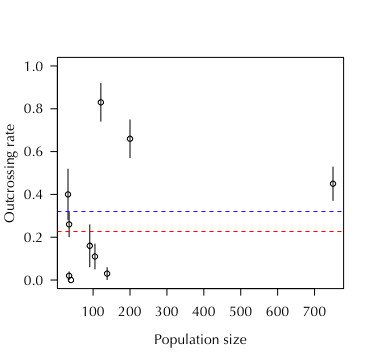Population size
The outcrossing rate is a fundamental attribute of plant populations that determines population genetic structure, individual plant fitness, and ultimately speciation rates. The outcrossing rate can be influenced by population size through reductions in both mate availability and pollinator service. We investigated the effect of population size on the outcrossing rate in 10 populations of Aquilegia canadensis in Southern Ontario, Canada.
Across a range of sizes from 32 to 750 reproductive individuals, we found that small populations (n < 35, red line) had a significantly lower outcrossing rate than large populations (n > 90, blue line).

Given the high estimate for inbreeding depression in this species (0.88 ± 0.14), small populations may experience a rapid decline in population-level fitness that can lead to local extirpation. The consequences of human-induced habitat fragmentation suggest that such local extinctions are common due to this demographic effect.
Collaborator(s):
Publication(s):
- Routley M.B., Mavraganis K. & Eckert C.G., 1999, Effect of population size on the mating system in a self-compatible, autogamous plant, Aquilegia canadensis (Ranunculaceae). Heredity 82: 518–528 [link][PopulationSizeT.pdf]